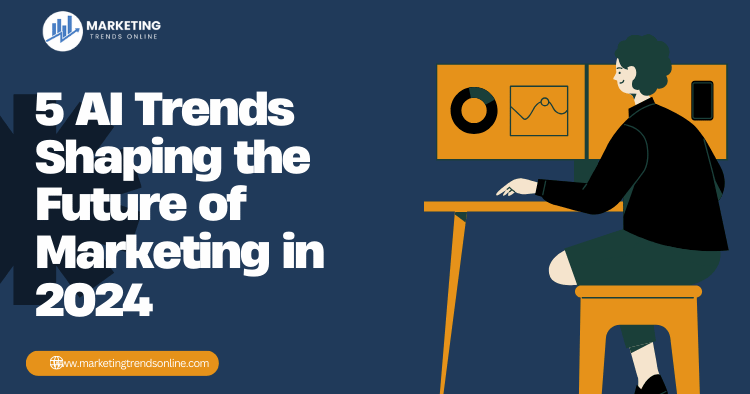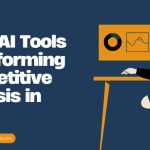Table of Contents
- Introduction
- 1. Personalization at Scale
- 2. Predictive Analytics
- 3. AI-Powered Content Creation
- 4. Voice and Visual Search Optimization
- 5. Enhanced Customer Engagement
- Conclusion
- FAQs
Introduction
The marketing landscape is rapidly evolving, and artificial intelligence (AI) is at the forefront of this transformation. As we step into 2024, businesses are increasingly leveraging AI technologies to enhance their marketing strategies. From driving personalization to optimizing customer engagement, AI is set to reshape how brands connect with consumers. In this article, we’ll explore five key AI trends that are poised to shape the future of marketing in 2024.
1. Personalization at Scale
In a world where consumers are bombarded with content, personalization is no longer just a nice-to-have; it’s a necessity. AI enables marketers to analyze vast amounts of data to understand customer preferences, behaviors, and needs. With this insight, brands can deliver tailored experiences to individuals, increasing engagement and conversion rates.
“Personalization is the key to making customers feel valued and understood. It’s about creating meaningful connections.”
Why It Matters
- Increased Engagement: Personalized content can lead to higher open rates, click-through rates, and sales.
- Customer Loyalty: When customers feel understood, they are more likely to return to a brand.
Example
Imagine receiving an email that suggests products based on your past purchases and browsing history. AI algorithms analyze this data to recommend items that you’re likely to be interested in, creating a seamless shopping experience.
For further reading on personalization, check out Top 7 Content Personalization Trends 2024-2025.
2. Predictive Analytics
Predictive analytics uses historical data, machine learning, and statistical algorithms to predict future outcomes. In marketing, this means businesses can anticipate customer behavior and preferences, allowing them to craft proactive strategies.
“The power of predictive analytics lies in its ability to turn data into actionable insights, paving the way for smarter marketing decisions.”
Key Benefits
- Better Decision-Making: Marketers can make informed decisions based on data-driven insights rather than gut feelings.
- Increased ROI: By targeting the right customers at the right time, companies can optimize their marketing spend.
Use Cases
Brands can utilize predictive analytics to forecast which products will be popular in the coming months, enabling them to adjust their inventory and marketing strategies accordingly.
Learn more about predictive analytics in marketing from Top 10 Content Marketing Tools Boost Strategy 2024.
3. AI-Powered Content Creation
Creating high-quality content is essential for any marketing strategy, but it can be time-consuming and resource-intensive. AI content creation tools are emerging as valuable assets for marketers, generating everything from blog posts to social media updates.
“AI can be a powerful ally in content production, enabling marketers to focus on creativity and strategy rather than getting bogged down in execution.”
Advantages
- Efficiency: AI can produce content quickly, freeing up human creatives to focus on strategy and ideation.
- Consistency: AI tools ensure a consistent brand voice across various channels.
Challenges
While AI can assist in content creation, it’s essential to maintain a human touch to connect authentically with audiences.
For a deeper dive into AI content generation, check out Top 7 Content Repurposing Trends for 2024 Success.
4. Voice and Visual Search Optimization
With the rise of smart speakers and visual search technologies, optimizing for voice and image search is becoming crucial for marketers. AI helps companies understand how consumers use voice commands and visual cues to search for products and services.
“Adapting to voice and visual search is not just about technology; it’s about understanding a new way consumers interact with information.”
Importance
- Changing Search Behaviors: As more people use voice search, it’s vital to adapt SEO strategies to include natural language and conversational keywords.
- Visual Search: AI-powered visual search tools allow consumers to search using images, enhancing the shopping experience.
Tips for Optimization
- Utilize structured data to help search engines understand your content.
- Optimize images with relevant alt text and descriptions.
For more on this topic, visit Top 7 SEO Trends Startups Must Follow 2024.
5. Enhanced Customer Engagement
AI-driven tools are revolutionizing how brands engage with customers. Chatbots, personalized email campaigns, and social media interactions powered by AI are becoming standard practice.
“Enhanced engagement through AI not only improves customer satisfaction but also fosters long-term relationships between brands and consumers.”
Benefits
- 24/7 Availability: Chatbots can respond to customer inquiries at any time, improving customer satisfaction.
- Tailored Interactions: AI can analyze customer data to provide personalized responses and recommendations.
Implementation
Brands can implement AI chatbots on their websites or social media platforms to streamline customer support and engagement.
Explore more about AI in customer service through 10 Ways AI Transforms Customer Service 2024.
Conclusion
As we move further into 2024, the integration of AI in marketing will continue to sharpen competitive edges. Businesses that embrace these AI trends—personalization at scale, predictive analytics, AI-powered content creation, voice and visual search optimization, and enhanced customer engagement—will not only meet but exceed customer expectations. Staying ahead of these trends will ensure your marketing strategies remain relevant and effective in this digital age.
FAQs
Q1: How can small businesses leverage AI in marketing?
Small businesses can start by using AI tools for email marketing, social media management, and customer service chatbots. Many affordable options are available that cater specifically to smaller budgets.
Q2: What are the risks of using AI in marketing?
The risks include data privacy concerns and the potential for AI-generated content to lack a human touch. It’s essential to balance AI use with human creativity and oversight.
Q3: Will AI replace human marketers?
While AI will automate certain tasks, human marketers will still play a crucial role in strategy, creativity, and relationship-building.
Q4: Is AI in marketing only for large companies?
No, AI tools are becoming increasingly accessible and affordable, making it possible for businesses of all sizes to benefit from AI technologies.
For more insights on the future of AI in marketing, keep exploring and stay informed!
By staying ahead of these trends, marketers can ensure they are not only keeping pace with the industry but also paving the way for innovative strategies that resonate with their audiences.




